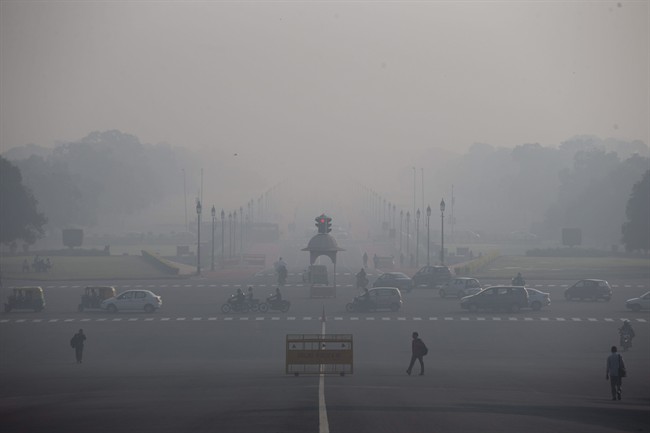NEW DELHI – India’s top court issued several orders Wednesday to fight record pollution in the capital, including a temporary ban on the sale of large diesel vehicles and a stiff levy on trucks entering the city.

The Supreme Court ordered sales of all diesel vehicles with an engine capacity of more than 2,000cc to be halted for the next three months in New Delhi and nearby suburbs. It also banned trucks from entering the capital if they’re over 10 years old or are transiting through the city.
In addition, all taxis in the area, including private ride-hailing services such as Uber, have to switch to compressed natural gas by March 31.
Chief Justice Tirath Singh Thakur also ordered New Delhi authorities to strictly impose restrictions on the burning of waste. Despite a ban, black clouds of smoke are often seen in the city as gardeners and sanitation workers burn leaves and garbage in the open.
Last year, the World Health Organization named New Delhi the world’s most polluted city, with 12 other Indian cities ranking among the worst 20. Air pollution contributes to more than 600,000 deaths each year in India.

Get breaking National news
This year in New Delhi, Indian environment monitoring authorities have found record levels of the tiny, inhalable particles that are measured to indicate pollution levels.
The particles – called PM2.5 – are of particular concern because, with diameters no greater than 2.5 micrometers, they’re small enough to penetrate deep into the lungs.
For the ordinary person, the effects of pollution in New Delhi are palpable: grey, overladen skies, difficulty in breathing and the smell of vehicle exhaust that pervades the air.
Less than two weeks ago, the city’s government announced that from Jan. 1-15, private cars will be allowed on New Delhi’s roads only on alternate days, depending on whether their license plates end in an even or an odd number.
New Delhi authorities also announced plans to shut down one of the city’s oldest and least efficient thermal power plants.
The Supreme Court’s rulings Wednesday were widely welcomed by environmentalists, who said strong action was required because New Delhi was choking with dense smog.
“This action on diesel vehicles was absolutely needed,” said Anumita Roy Chowdhury of the Centre for Science and Environment, an independent think-tank . “There is one death every hour due to air pollution-related diseases in the city. The lungs of every third child in the city are impaired due to pollution.”
But she added that the success of the latest measures will depend on the government’s efforts to put them into action. “The government needs to work hard to ensure that the court’s decisions are implemented,” Roy Chowdhury said.
Diesel vehicles spewing black clouds of exhaust, construction dust and the burning of crop stubble in farms in neighbouring states all contribute to the extreme air pollution in New Delhi.





Comments